昔日文章
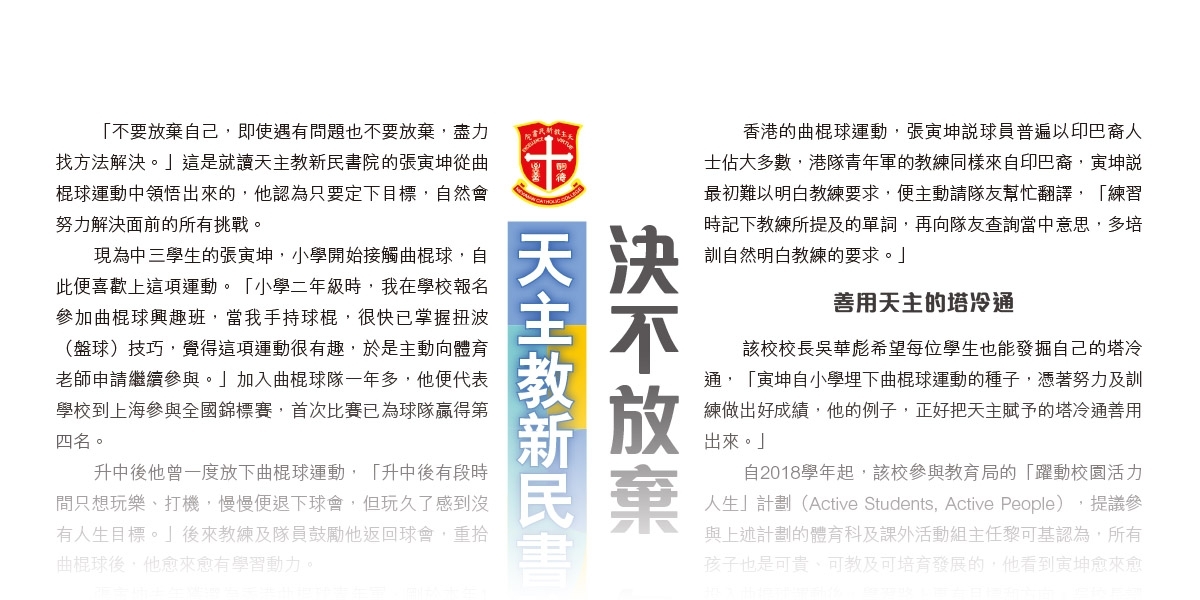

體藝傳情_中學
2023.02.24
天主教新民書院張寅坤
決不放棄 向著理想邁進
「不要放棄自己,即使遇有問題也不要放棄,盡力找方法解決。」這是就讀天主教新民書院的張寅坤從曲棍球運動中領悟出來的,他認為只要定下目標,自然會努力解決面前的所有挑戰。
現為中三學生的張寅坤,小學開始接觸曲棍球,自此便喜歡上這項運動。「小學二年級時,我在學校報名參加曲棍球興趣班,當我手持球棍,很快已掌握扭波(盤球)技巧,覺得這項運動很有趣,於是主動向體育老師申請繼續參與。」加入曲棍球隊一年多,他便代表學校到上海參與全國錦標賽,首次比賽已為球隊贏得第四名。
升中後他曾一度放下曲棍球運動,「升中後有段時間只想玩樂、打機,慢慢便退下球會,但玩久了感到沒有人生目標。」後來教練及隊員鼓勵他返回球會,重拾曲棍球後,他愈來愈有學習動力。
張寅坤去年獲選為香港曲棍球青年軍,剛於本年1 月初,代表香港前往阿曼參與青年亞洲盃,去年底亦前往新加坡進行賽前測試賽。兩次往海外參賽累積的經驗,令他愈來愈了解自己的水平,「其他國家的運動員在盤球、射球等基本動作技巧也十分穩定,身體質素及體能也較佳,參賽的經驗使我在提升自己的球技很有幫助。」他說,自己的夢想是成為香港隊曲棍球代表,在運動上繼續發展。
曲棍球以對賽形式進行,每隊最多11人作賽,守門員須佩戴頭盔、護腿和護腳的護具,其他隊員手持曲棍球球棍,也會佩戴護腿板、護踝以及護齒等裝備。此項運動著重球員的比賽經驗,故此他每星期在港隊及球會進行三次訓練,每次培訓均設比賽。疫情前教練安排隊員於長假期到中國內地參與交流賽,其餘時間則參與青年軍聯賽及球會舉辦的賽事,「曲棍球重視團隊精神, 藉著比賽保持與隊友的默契。」
與張寅坤同樣就讀同一小學及中學的中五學生廖頌華,一同獲選香港曲棍球青年軍,在曲棍球場他倆是好拍檔,張寅坤屬前鋒位置,廖頌華擔任中場,二人在場上早已建立默契,廖頌華表示,只要見到寅坤在禁區跑出,便知道要儘快傳球給他。
香港的曲棍球運動,張寅坤說球員普遍以印巴裔人士佔大多數,港隊青年軍的教練同樣來自印巴裔,寅坤說最初難以明白教練要求,便主動請隊友幫忙翻譯,「練習時記下教練所提及的單詞,再向隊友查詢當中意思,多培訓自然明白教練的要求。」
善用天主的塔冷通
該校校長吳華彪希望每位學生也能發掘自己的塔冷通,「寅坤自小學埋下曲棍球運動的種子,憑著努力及訓練做出好成績,他的例子,正好把天主賦予的塔冷通善用出來。」
自2018學年起,該校參與教育局的「躍動校園活力人生」計劃(Active Students, Active People),提議參與上述計劃的體育科及課外活動組主任黎可基認為,所有孩子也是可貴、可教及可培育發展的,他看到寅坤愈來愈投入曲棍球運動後,學習路上更有目標和方向。吳校長認為,從寅坤積極運動的表現,彰顯出「Active Students, Active People」,他深信只要學生具備潛能,老師也會鼓勵及肯定他的能力。
參與曲棍球運動讓張寅坤學習時變得更主動,他說,自小學起已不時聽到教練鼓勵運動員「不要放棄自己」的話,現在此話也成為他的座右銘,並時常提醒自己要達成香港隊曲棍球代表為目標,現在他定期回到小學母校,陪伴學弟及學妹練習曲棍球,「運動帶給我責任感與紀律,球技提升後使我更有動力學習。」(高)
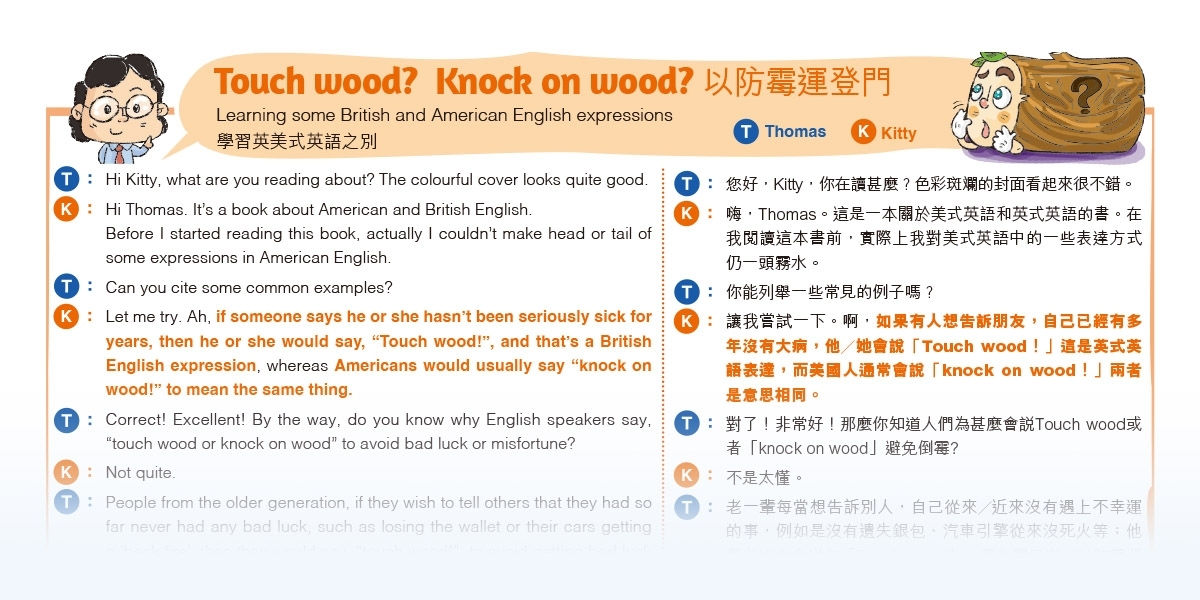
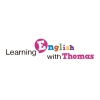
Learning English with Thomas
2023.02.19
Touch wood? Knock on wood?
以防霉運登門
Learning some British and American English expressions
學習英美式英語之別
T: Thomas J: Kitty
T : Hi Kitty, what are you reading about? The colourful cover looks quite good.
K : Hi Thomas. It’s a book about American and British English.
Before I started reading this book, actually I couldn’t make head or tail of some expressions in American English.
T : Can you cite some common examples?
K : Let me try. Ah, if someone says he or she hasn’t been seriously sick for years, then he or she would say, “Touch wood!”, and that’s a British English expression, whereas Americans would usually say “knock on wood!” to mean the same thing.
T : Correct! Excellent! By the way, do you know why English speakers say, “touch wood or knock on wood” to avoid bad luck or misfortune?
K : Not quite.
T : People from the older generation, if they wish to tell others that they had so far never had any bad luck, such as losing the wallet or their cars getting a ‘back fire’, then they would say, “touch wood!”, to avoid getting bad luck that may be just around the corner waiting for them.
K : I see.
T : As a matter of fact, there is also a similar usage in Chinese, namely, “toi-lai”, meaning literally. “relying under the protection of external force”.
K : That’s very interesting. (Thomas nodding smilingly)
T : 您好,Kitty,你在讀甚麼?色彩斑斕的封面看起來很不錯。
K : 嗨,Thomas。這是一本關於美式英語和英式英語的書。在我閱讀這本書前,實際上我對美式英語中的一些表達方式仍一頭霧水。
T : 你能列舉一些常見的例子嗎?
K : 讓我嘗試一下。啊,如果有人想告訴朋友,自己已經有多年沒有大病,他╱ 她會說「Touch wood!」這是英式英語表達,而美國人通常會說「knock on wood!」兩者是意思相同。
T : 對了!非常好!那麼你知道人們為甚麼會說Touch wood或者「knock on wood」避免倒霉?
K : 不是太懂。
T : 老一輩每當想告訴別人,自己從來╱近來沒有遇上不幸運的事,例如是沒有遺失銀包、汽車引擎從來沒死火等;他們之後也會說句「Touch wood」,避免開口中,以防霉運登門。
K : 原來如此。
T : 其實,中文也有類似用法, 例如「托賴」,意思是指有賴於外力保護。
K : 這很有趣。(Thomas 微笑點頭)
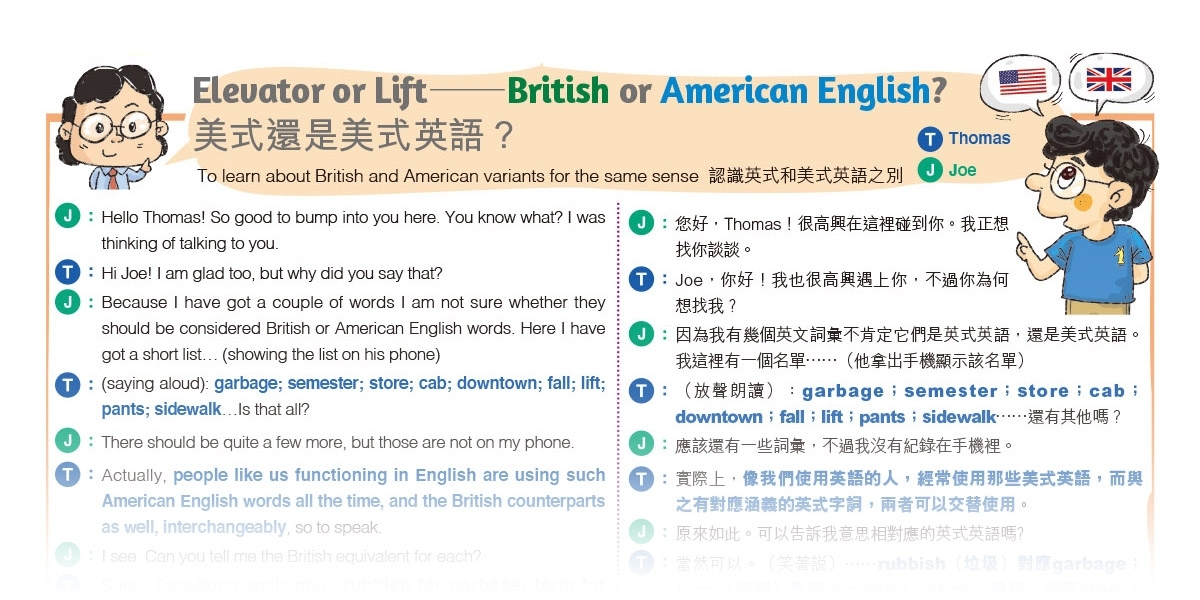

Learning English with Thomas
2022.11.27
Elevator or Lift —— British or American English?
美式還是美式英語?
To learn about British and American variants for the same sense 認識英式和美式英語之別
T : Thomas J : Joe
J : Hello Thomas! So good to bump into you here. You know what? I was thinking of talking to you.
T : Hi Joe! I am glad too, but why did you say that?
J : Because I have got a couple of words I am not sure whether they should be considered British or American English words. Here I have got a short list… (showing the list on his phone)
T : (saying aloud): garbage; semester; store; cab; downtown; fall; lift; pants; sidewalk…Is that all?
J : There should be quite a few more, but those are not on my phone.
T : Actually, people like us functioning in English are using such American English words all the time, and the British counterparts as well, interchangeably, so to speak.
J : I see. Can you tell me the British equivalent for each?
T : Sure…(speaking smilingly)…rubbish for garbage; term for semester; shop for store; taxi for cab; town centre for downtown; autumn for fall; elevator for lift; trousers for pants; and pavement for sidewalk.
J : That’s another lesson for me today. Shall we go for lunch together?
J : 您好,Thomas!很高興在這裡碰到你。我正想找你談談。
T : Joe,你好!我也很高興遇上你,不過你為何想找我?
J : 因為我有幾個英文詞彙不肯定它們是英式英語,還是美式英語。我這裡有一個名單……(他拿出手機顯示該名單)
T :(放聲朗讀):garbage;semester;store;cab; downtown;fall;lift;pants;sidewalk……還有其他嗎?
J : 應該還有一些詞彙,不過我沒有紀錄在手機裡。
T : 實際上,像我們使用英語的人,經常使用那些美式英語,而與之有對應涵義的英式字詞,兩者可以交替使用。
J : 原來如此。可以告訴我意思相對應的英式英語嗎﹖
T : 當然可以。(笑著說)……rubbish(垃圾)對應garbage; term(學期)對應semester;shop(商店)對應store; taxi(計程車)對應cab;town centre(市中心)對應downtown;autumn(秋天)對應fall;elevator(升降機) 對應 lift;trousers(長褲)對應 pants;and pavement(行人路)對應 sidewalk.
J : 今天又上了一課。不如我們一起吃午餐?
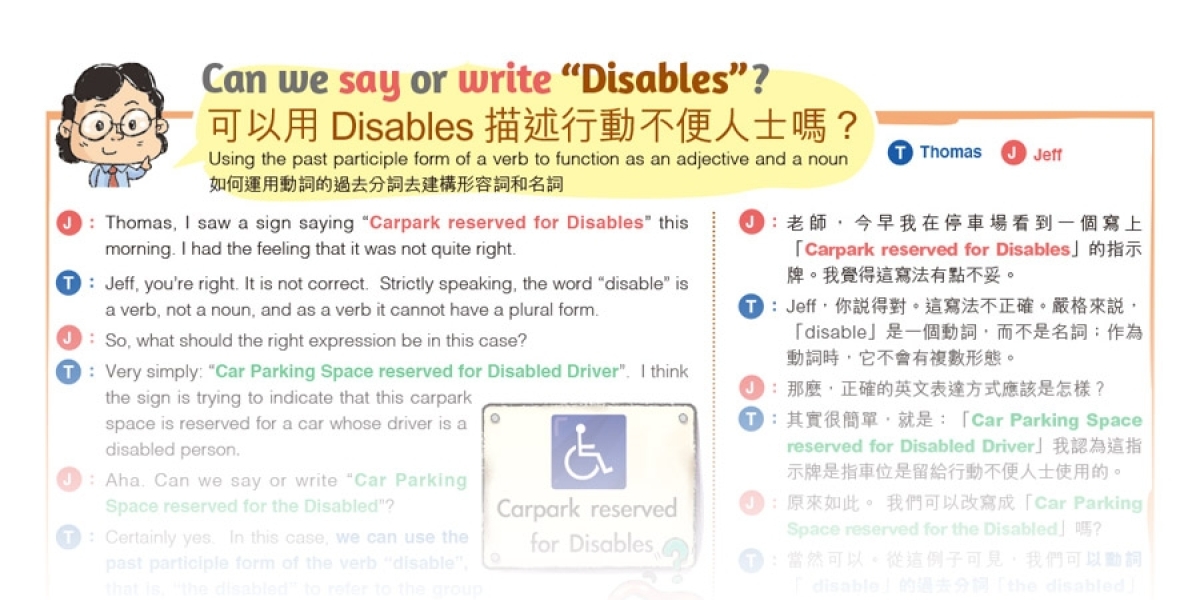

Learning English with Thomas
2022.10.30
Can we say or write “Disables” ?
可以用Disables 描述行動不便人士嗎?
T: Thomas J=Jeff
Using the past participle form of a verb to function as an adjective and a noun
J: Thomas, I saw a sign saying “Carpark reserved for Disables” this morning. I had the feeling that it was not quite right.
T: Jeff, you’re right. It is not correct. Strictly speaking, the word “disable” is a verb, not a noun, and as a verb it cannot have a plural form.
J: So, what should the right expression be in this case?
T: Very simply: “Car Parking Space reserved for Disabled Driver”. I think the sign is trying to indicate that this carpark space is reserved for a car whose driver is a disabled person.
J: Aha. Can we say or write “Car Parking Space reserved for the Disabled”?
T: Certainly yes. In this case, we can use the past participle form of the verb “disable”, that is, “the disabled” to refer to the group of people under description, like “the rich”, “the poor”, “the privileged”, etc. See?
J: Loud and clear, Sir. And thank you, Sir.
如何運用動詞的過去分詞去建構形容詞和名詞
J: 老師, 今早我在停車場看到一個寫上「Carpark reserved for Disables」的指示牌。我覺得這寫法有點不妥。
T: Jeff,你說得對。這寫法不正確。嚴格來說, 「disable」是一個動詞,而不是名詞;作為動詞時,它不會有複數形態。
J: 那麼,正確的英文表達方式應該是怎樣?
T: 其實很簡單,就是:「Car Parking Space reserved for Disabled Driver」我認為這指示牌是指車位是留給行動不便人士使用的。
J: 原來如此。 我們可以改寫成「Car Parking Space reserved for the Disabled」嗎?
T: 當然可以。從這例子可見,我們可以動詞「 disable」的過去分詞「the disabled」來描述一個群體, 例如: 「t h e r i c h 」(富人) ,「the poor」(窮人), 「the privileged」(特權人士) 等等,明白嗎?
J: 你的解釋很清楚。謝謝老師。


